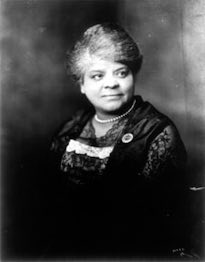Born of enslaved people, Ida B. Wells-Barnett fought to stop the lynching of Black Americans, carrying her fight to the White House. In 1898 she was part of a delegation to President McKinley demanding government action in the case of a Black mail carrier who had been lynched in South Carolina.
Wells-Barnett’s parents, freed from enslavement shortly after her birth, died of yellow fever when she was 16. To support her brother and sisters, she became a schoolteacher. While she was traveling to a school in Memphis, Tennessee, a train conductor insisted she move from the parlor car to the smoking car, the one reserved for Black passengers. She refused; he grabbed her wrist; she bit him, and Wells-Barnett brought a suit against the railroad for their actions and won. Later, however, the state court overruled the decision of the circuit court.
Her teaching career ended after she wrote a series of articles denouncing the education provided to Black children. She then became part owner of the Memphis Star newspaper. When three of her friends were lynched on false charges, she wrote searing attacks against the practice of lynching. As a result of these and other articles which challenged the actions of white people against Black Americans, her newspaper was sacked and destroyed. But Wells-Barnett continued the fight, carrying her message to Europe and throughout the country.
She was one of the founders of the NAACP and was active in the Negro Women’s Club movement. She opposed Booker T. Washington’s philosophy of accommodation. She, along with other Black women, marched in suffrage parades, and she worked with Jane Addams to block the segregation of schools in Chicago. Ida B. Wells-Barnett was fearless and respected, an uncompromising fighter for the rights of all human beings.

